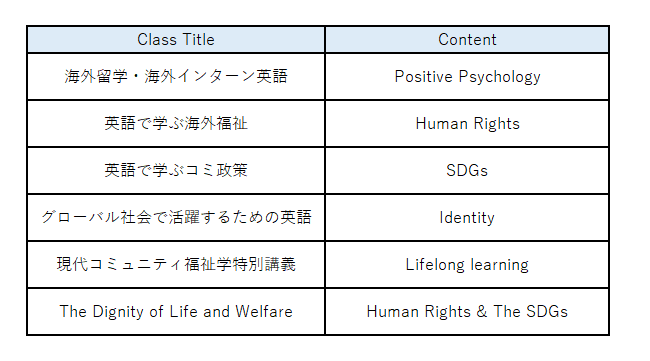人生は貴重なものなので、それを最大限に活用して、最高の自分になりましょう。
コミュニティ政策学科 Steven Paydon助教(モチベーション、グループダイナミクス、生涯学習自己決定理論、ポジティブ心理学)
2023/10/18
教員
研究内容
オーストラリアから来たペイドンと申します。2022年にコミュニティ政策学科に着任しました。1999年に日本で教えるようになり、それ以前は台湾とオーストラリアで教えていました。基本的に、モチベーションとグループダイナミクスを研究テーマとしています。さらに、生涯学習プログラムで英語を学ぶシニア世代に自己決定理論(self-determination theory)を適用する研究もしています。最近は、ポジティブ心理学の考え方を日本の教育に応用するメリットを研究することにも興味があります。どうぞよろしくお願い致します。
My research has always been aimed at helping me to become a better teacher. I started my teaching career in Taiwan in 1993 while working and backpacking my way around the world. Upon realizing that teaching suited me, I returned to Australia to requalify myself for a career in teaching. I started by enrolling in an undergraduate degree in Asian Studies because I wanted to return to Asia to work, and I combined that with a certification to teach English as a foreign language.
While in Australia I taught students from all over the world at a private language college in Sydney. Once I had completed my new qualifications, I returned to Taiwan to pay off my school debt, before moving permanently to Japan in 1999. Once I had settled in Japan, I studied for a Master of Arts Degree in Applied Linguistics and focused on motivation and group dynamics so that I could understand what motivated Japanese students, and because I was also interested in creating learning environments in which my students could thrive. After completing my Masters, I became interested in research into lifelong learning for senior students. I am still doing research into lifelong learning, but have also become interested in applying the principles of positive psychology into Japanese classrooms to help students understand what makes people happier and more resilient.
During my teaching journey, I have taught a wide range of students from all over the world, from kindergarten through high school, university and even in lifelong learning programs for senior citizens. Through this journey, the one thing that has always stood out to me is the importance of interpersonal relationships in the classroom. Not only the relationship between the teacher and the students, but also between the students themselves.
My research has always been aimed at helping me to become a better teacher. I started my teaching career in Taiwan in 1993 while working and backpacking my way around the world. Upon realizing that teaching suited me, I returned to Australia to requalify myself for a career in teaching. I started by enrolling in an undergraduate degree in Asian Studies because I wanted to return to Asia to work, and I combined that with a certification to teach English as a foreign language.
While in Australia I taught students from all over the world at a private language college in Sydney. Once I had completed my new qualifications, I returned to Taiwan to pay off my school debt, before moving permanently to Japan in 1999. Once I had settled in Japan, I studied for a Master of Arts Degree in Applied Linguistics and focused on motivation and group dynamics so that I could understand what motivated Japanese students, and because I was also interested in creating learning environments in which my students could thrive. After completing my Masters, I became interested in research into lifelong learning for senior students. I am still doing research into lifelong learning, but have also become interested in applying the principles of positive psychology into Japanese classrooms to help students understand what makes people happier and more resilient.
During my teaching journey, I have taught a wide range of students from all over the world, from kindergarten through high school, university and even in lifelong learning programs for senior citizens. Through this journey, the one thing that has always stood out to me is the importance of interpersonal relationships in the classroom. Not only the relationship between the teacher and the students, but also between the students themselves.
学部での教育活動

All of my classes are in English, so if you would like to improve your English skills, please join one of my classes. The classes I teach are all content courses, which means that you’ll be using English as a tool of communication; not as a subject to be tested on. A list of some of my classes and the content themes are in the table on the right.
This year I am also in charge of the Florida Internship program. I’ll be taking a group of students to Florida to study at the Disney Imagination Campus. This is a fantastic opportunity for students to learn directly from Disney. The students will be studying four different subjects along with other students from America and other foreign countries. The four subjects are 1) Storytelling, 2) Theme Park Design, 3) Teamwork, and 4) Leadership.
This year I am also in charge of the Florida Internship program. I’ll be taking a group of students to Florida to study at the Disney Imagination Campus. This is a fantastic opportunity for students to learn directly from Disney. The students will be studying four different subjects along with other students from America and other foreign countries. The four subjects are 1) Storytelling, 2) Theme Park Design, 3) Teamwork, and 4) Leadership.
実践的な取り組み
One of the courses I teach is called "現代コミュニティ福祉学特別講義". In this course, we focus on lifelong learning in Japan. The students choose their own topics within lifelong learning in the Japanese context. In the first semester, the students do background research into their topic and write a research paper. Then, in the second semester, they add applied research to their paper and have the option of publishing their papers in the Manabiai journal.
受験生へのメッセージ
私はこれまで国内外の様々な学校で教えてきましたが、現在、立教大学で教えることに大変な喜びを感じています。設備はもちろん、講師陣もプログラムも全てがとても素晴らしいと思います。皆さんが 学び、研究し、自分自身を成長させるのに最適な学校だと思います。私は立教大学で教えることを大変楽しんでおりますし、皆さんも きっと ここで 楽しみながら 学ぶことができると信じています。
※インタビュー当時の情報です。
